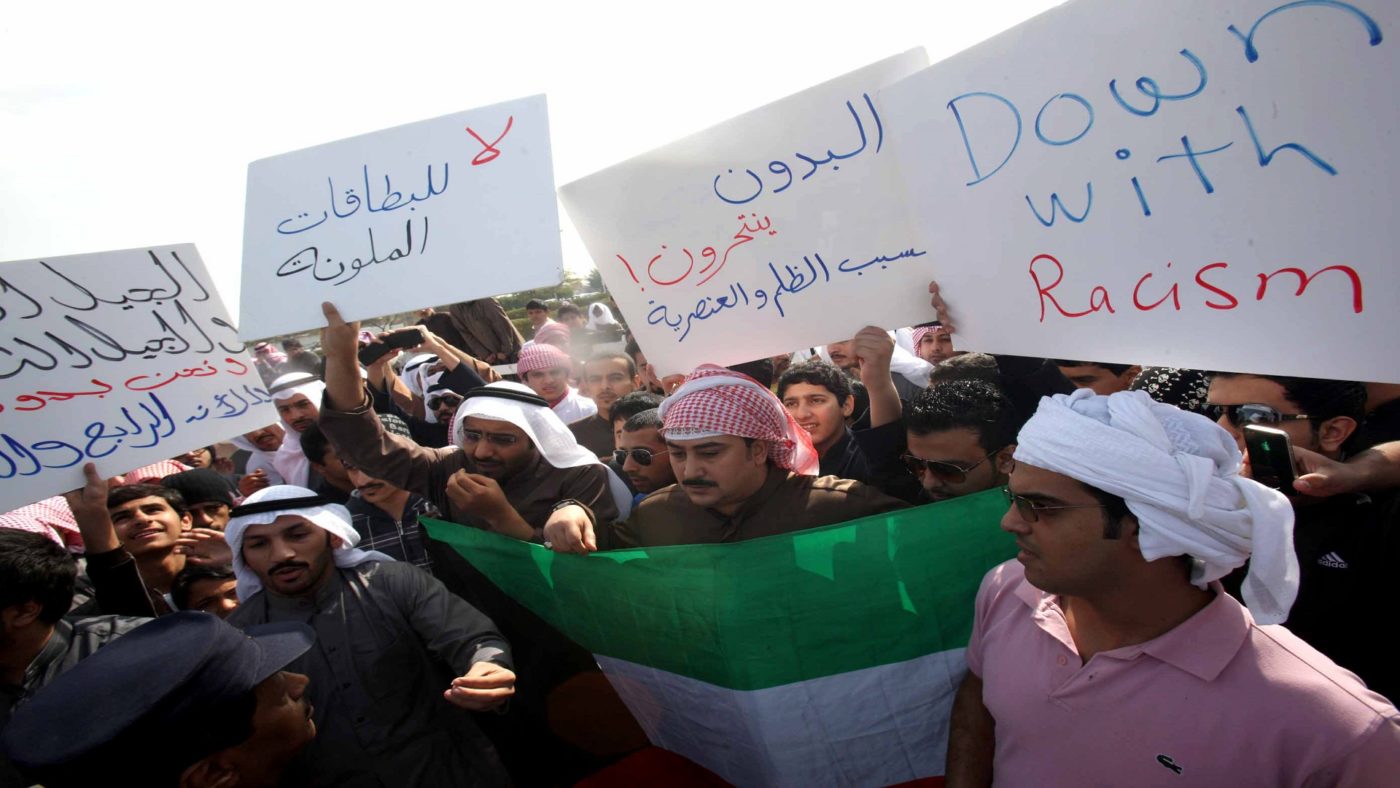Stateless individuals, human rights defenders and government critics are routinely subjected to torture and cruel, inhuman or degrading treatment within the country of Kuwait. This is despite Kuwait being party to the United Nations Convention Against Torture (CAT) which stipulates prohibitions on such actions and strictly requires state parties to implement effective legislative, administrative, judicial or other measures to prevent acts of torture in any territory under its jurisdiction. This prohibition applies at any time, including; peacetime, war, a state of emergency and political instability. There is no justification for torture within a state territory, even if it comes from an order from a superior officer or a public authority.
The treatment of the Biddon community in Kuwait routinely violates CAT, especially in respect to their lack of nationality. In fact, the status of statelessness is tantamount to being a second-class citizen in the country. Many everyday actions are degrading and more arduous for a stateless person to commit in comparison to a full citizen. In this way, by Kuwait refusing to grant citizenship to the Bidoon, they are forcing them to be treated as subhuman in society. This amounts to a form of cruel, inhuman and degrading treatment. This treatment can also be regarded as discrimination on the basis of nationality status, which is also in contravention of CAT. This is because of the very fact that Bidoon are treated in a discriminatory manner, on the basis of their (lack of) nationality.
The Bidoon community are a minority group of stateless people who consist of 180,000 residents within the country. This community of people are particularly targeted by the Kuwaiti authority in a way that is in contravention with CAT. Alongside the Bidoon, human rights defenders and those campaigning for equal treatment are often arrested and then subjected to intimidation, or physical mistreatment, with no access to legal redress of these actions nor an effective system of punishment for the perpetrators of such crimes. The Bidoon have continually faced worsening conditions in Kuwait since 2011.
Arbitrary arrest and detention can be used as a way by the Kuwait authorities to dehumanise Biddon individuals, placing them in a position in contravention with their dignity as a person. As recently as 2019, Kuwaiti security forces arbitrarily arrested 15 Bidoon men in a crackdown on peaceful protestors who had been demanding greater rights for the stateless group. There have been credible reports of torture against those who protest peacefully or work on behalf of the Bidoon community. This can include acts of physical violence as a means of intimidation to coerce a confession. Those within the Bidoon community suffer disproportionately from arbitrary arrest and detention. Even when they are eventually charged, they are held for extended periods of time, compared to their Kuwaiti counterparts, and usually endure acts of inhuman and degrading treatment.
Such examples of Biddon Activists include Nawaf Al-Bader, the secretary of the Kuwaiti Bidoon committee who has been targeted for his human rights activities since 2004. He is one of the 15 men arrested in 2019, together with Abdulhakim Al-Fadhli, Ahmed Al-Onan, Awad Al-Onan, Abdullah Al-Fadhli, Mutaib Al-Onan, Mohammed Khudair Al-Anzi, Yousif Al-Osmi, Hamid Jamil, Yousif Al-Bashig, Jarallah Al-Fadhli, and Ahmed Shaya Al-Anzi.
Records of Al-Bader being subjected to torture and cruel, inhuman or degrading treatment date as far back to October 2012, where he was arrested, tortured and detained for over 100 days without just cause for his arrest. He was beaten, blindfolded and kept in a painful stressful position for hours. Abdulhakim and his brother Abdulnasser were arrested again in 2014 for demonstrating in support of Bidoon rights. They were interrogated without any lawyer being present. Abdulhakim chose to begin a hunger strike in opposition to the extension of his unlawful detention, which eventually led to his release. Later on, the two brothers confirmed in court that they were tortured. However, these allegations have since been ignored. Later in the same year, Abdulhakim was arrested and detained again for another month. While being detained, he was again subjected to ill-treatment and physical assault which led again to a hunger strike in protest of his inhumane treatment. In September 2014, he was sentenced to six months in prison after being accused of allegedly assaulting a police officer. This was despite medical records showing that he had been beaten by a police officer who brought the claims against him.
Officially, the Kuwaiti national constitution does indeed criminalise torture, along with other legislative instruments. Yet, the country fails to effectively implement such prohibitions, and even when allegations of torture surface, they are are often not investigated fully, nor the perpetrators punished proportionately. This encourages a culture of impunity within Kuwaiti law enforcement. This is also a clear violation of articles 12 and 13 of UNCAT, which ensure prompt and impartial investigations “wherever there is a reasonable ground to believe that an act of torture has been committed”. In addition, any attempts to claim compensation for their ill-treatment or torture, which is required by article 14, has been ignored by Kuwaiti authorities.
Despite ratifying CAT, Kuwait has not taken the significant steps needed to address the systemic issues surrounding torture, cruel, inhuman or degrading treatment of its citizens in custody. Although there are domestic laws that prohibit torture in the country, cases of torture, cruelty, and the mistreatment of prisoners, particularly concerning the Bidoon, are still extremely prevalent. Even though not all cases involve direct physical violence, the conditions that many dissidents or protesters are held in are inhuman and unconscionable. As the government continues to crack down on the stateless Bidoon community, and those who speak against the government and its injustices, ADHRB calls on the Kuwaiti government to stop the mistreatment of its own citizens.





